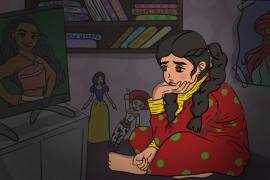Article in brief: The author discusses the importance of acknowledging the power of television on the minds of children.

People often underestimate the power television has over children. The things we grow up watching and learning are the things that often shape us as we grow older.
Like every child out there, I had my fair share of TV time. I grew up in front of a TV set that mostly showed a set of cartoon shows that only had one female character. I’m talking about the Animaniacs, The Muppets and The Smurfs.
I never really paid any attention to it until I recently stumbled upon an article written by poet and essayist Katha Pollitt for The New York Times entitled “Hers; The Smurfette Principle”. An interesting term that can be defined as having a work of fiction star an ensemble of males, and contain only one female that is way less significant than the male characters. That single female character usually tends to be irrelevant and not carry that big of a storyline but is merely a follower of the male characters.
What struck me the most is that this article was written in 1991. It is quite upsetting to realize that in 2015, not much has changed. Modern cartoon shows mostly star male characters and have them do all the action, whereas female characters are left to be part of the action.
I’m not saying that nothing has changed; plenty of shows have introduced several female characters. To be fair, there are a few shows out there that star female characters. But the thing is, those shows’ target audience happens to be female only. Shows that target both genders rarely have a female star.
Still, it gets you to think: does it have an effect on children developing gender stereotypes? The answer to that is a definite yes. Children’s way of thinking gets molded before they actually understand what is going on.
TV shows that contain such components only make young girls feel like they are followers and not leaders. They make girls believe that they can never be the face of anything, but mere participants. In the same way, it makes boys feel that dominance belongs solely to them and that girls are nothing more than what the male gender chooses to involve them in.
Looking back at the 90s, there are sadly more similarities than differences. The issue is anything but extinct. It still exists and little children across the world watch this phenomenon on a daily basis. It is vital to watch what enters the minds of the people who will grow up to make up future generations. Something as silly as a cartoon show can affect the way a future politician, a writer and even a businessperson thinks.
It is up to us to prevent mistakes made over two decades ago from reoccurring. In addition, it is very necessary to look into things on a deeper level and recognize their effects. Our children are our future, and as such we should work hard on providing appropriate entertainment for them in hopes of avoiding them growing up and producing negative and biased ideologies.




1 Comment